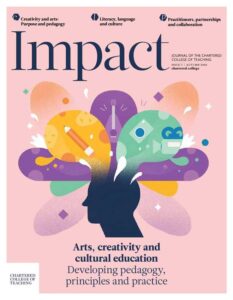The importance of regular review for long-term learning

Rosenshine’s principles of instruction (2012) offer 10 research-based strategies with suggestions for classroom practice. Here, I discuss how principles one and 10, relating to the importance of regular review for long-term learning, can be used in practice in the modern foreign languages (MFL) classroom – but many of these ideas are applicable across different subject areas, too.
Principle one: Begin each lesson with a short review of previous learning
When learning a modern language, there are a number of grammatical concepts that students need to grasp in order to learn more complex grammatical structures. For example, without a solid understanding of the conjugation of regular present tense verbs, students are unlikely to comprehend the irregulars or other tenses.
A problem is that methods that may seem to rapidly increase student performance in the short term (i.e. in the space of one lesson) can fail to support retention of knowledge in the long term (i.e. over a series of lessons, months or years)(Bjork and Kroll, 2015). It might seem as if students are performing well in the lesson itself, so teachers may think what they are doing is effective, but in reality, students are rapidly forgetting material once they have left the classroom. That which students find easy is not always what is best for their learning (Bjork, 1994).
A review of previous learning at the start of each lesson is one way to strengthen students’ retention of knowledge. If you are teaching, for example, the near future tense in Spanish/French, you may wish to use the review to remind students what they know about the present tense of the verb ir/aller. There are a number of ways in which to do this:
- Brain ‘dump’ – ask students to write everything they can remember about the verb ir/aller without looking at their notes.
- Match up – provide the target language and the English. Students need to match up the two sides.
- Fill in the blanks – provide a table with the whole verb paradigm for ir/aller in the present tense. Remove some of the content and ask students to fill it back in.
- Thinking quilt – an idea found on Twitter from @KKNTeachLearn and adapted for MFL by @morganMFL. Create a table like the one in Table 1, with the whole present tense paradigm of the verb mixed with one or more other verbs. Students need to highlight the verb aller in one colour and the others in another.
- A memory challenge task, where pupils are asked to, for example, recall words, select the odd one out from a list of words, conjugate a verb, or translate a series of words, can be used to get students to not only recognise the language they will need in the lesson but also work on how to form it.
- Knowledge retrieval tasks, where students are asked to recall a mixture of key vocabulary from last lesson, last week, last month or even last year, can be used to combine the knowledge you need students to reactivate (aller/ir) with other useful vocabulary they have studied in the past.

Examples and templates of the above activities can be downloaded from: http://learninglinguist.co.uk/ mfl-starters-incorporating-retrieval-practice. Students may struggle with these kinds of activities at first, but the benefits of this initial struggle will be realised over the longer term. As well as improving retention of knowledge, these kinds of activities can also support formative assessment, providing the teacher with useful information about gaps and areas of strength.
Principle 10: Engage students in weekly and monthly review
Reviewing previous learning isn’t just about reviewing things from the previous lesson; Rosenshine also reminds us of the importance of reviewing over time, engaging students in weekly and monthly review (Rosenshine, 2012) once they have started to forget things – ‘forgetting’ is a really important step in the learning process, and recalling content after a gap helps to strengthen our ability to remember it in the longer term (Weinstein et al., 2019).
It is also particularly important that we continue to bring previous learning to mind so that students can apply this knowledge to a new context. Take, for example, learning to use the words ‘ya no’(no longer) and ‘todavia’ (still) in Spanish. In one of the major textbooks, these are taught to students in the context of sports and what they used to do in their free time. Without encouraging students to apply these structures to topics such as school, holidays, family, work, etc., these structures will only be associated with the original context in which they were learned. Frequent review allows us to encourage students to link these structures to a range of contexts.
One way of doing this might be to begin each lesson with a task that requires students to relate their knowledge of these grammatical structures to different topics, as well as the one they have just been learning. We can encourage this weekly and monthly review either through starter activities in lessons or through homework. We could also consider how we are structuring assessments and whether we are requiring students to retrieve knowledge from modules other than those most recently studied.
Some ideas from a blog post by Mark Enser (HCC Ped Team, 2018) are:
- taking some one-to-one time with students to look over their work from the last few weeks and discuss what they have learned and the progress they have made
- making use of checklists and knowledge organisers to see how each element of learning fits into the bigger picture
- making sure that regular lesson-starter quizzes also include questions that test previous learning.
Homework policies will vary from school to school but, where possible, you could consider structuring homework so that it incorporates plenty of reviewing. This could be through use of tools such as Quizlet to review vocabulary and conjuguemos.com for reviewing grammar, or simply through worksheets. Structuring in this way could take some time. But in the long term it should pay off, as students will be more prepared to work with previously learned language and structures.
We must acknowledge that a lot of regular reviewing happens as a natural part of language learning. There are fundamental parts of language that we constantly come back to and expect students to practise time and time again. However, we do need to schedule opportunities for purposeful review when it comes to topic-specific vocabulary or lesser-used structures that don’t often come up.
It is important to consider what it is that you need students to remember in the long term and make sure that they are frequently being asked to think about exactly that across different contexts, in different types of tasks, and in both the production and comprehension of language. This will support students in developing well-connected and automatic knowledge.
References
Bjork R (1994) Memory and meta-memory considerations in the training of human beings. In: Metcalfe J and Shimamura AP (eds) Metacognition: Knowing about Knowing. Cambridge, MA: MIT Press, pp. 185–205.
Bjork RA and Kroll JF (2015) Desirable difficulties in vocabulary learning. The American Journal of Psychology 128(2): 241–252. Available at: www.jstor.org/stable/10.5406/amerjpsyc.128.2.0241 (accessed 12 April 2019).
HCC Ped Team (2018) Putting theory into practice. In: Heathfield Teach Share Blog. Available at: https://heathfieldteachshare.wordpress.com/2018/04/23/putting-theory-into-practice (accessed 7 July 2019).
Rosenshine B (2012) Principles of instruction: Research-based strategies that all teachers should know. American Educator 36(1). Available at: www.aft.org/sites/default/files/periodicals/Rosenshine.pdf (accessed 12 April 2019).
Weinstein Y, Sumeracki M and Caviglioli O (2019) Understanding How We Learn: A Visual Guide. London: Routledge.
This article was published in September 2019 and reflects the terminology and understanding of research and evidence in use at the time. Some terms and conclusions may no longer align with current standards. We encourage readers to approach the content with an understanding of this context.










